Downtown Boys: “Svi imamo ulogu u rušenju zida status quoa”
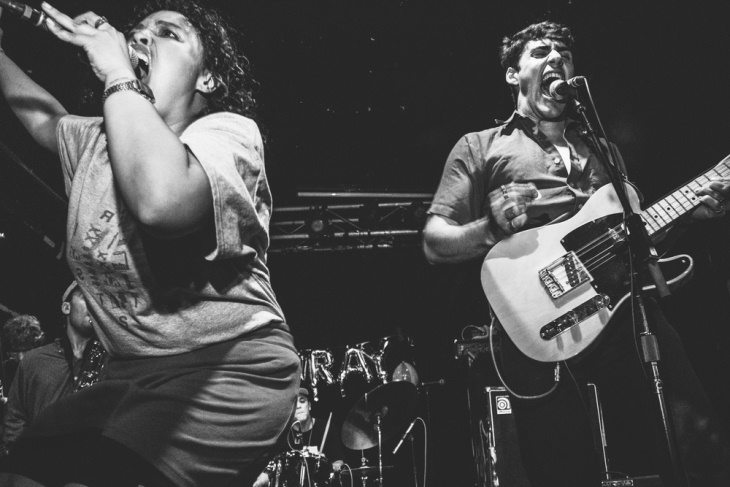
Močvaru će 9. lipnja znojem srednje klase natopiti Downtown Boys i Lime Crush – organizatori su događaj nazvali punk gigčinom. Ako već ne možete sudjelovati na nekom od prosvjeda koji niču po gradu, barem nemojte propustiti ovaj koncert. Da bismo vas pripremili na ono što vas čeka ako se tamo zateknete, razgovarali smo s Joeyjem La Neve DeFrancescom i Victorijom Ruiz iz biseksualne dvojezične političke dance sax punk stranke iz Providencea, Rhode Island. Oni su Downtown Boys i punk, uz pratnju saksofona i vrištećeg ženskog vokala, vraćaju gdje mu je mjesto.
Prepričajte nam ukratko epski događaj koji je prethodio osnivanju benda?
Joey: Mislite na video u kojem dajem otkaz? Bend smo zapravo osnovali prije nego je video napravljen, ali tada smo baš krenuli. Ja, Victoria i Norlan smo svi u videu. Prvotno smo i ja i Victoria radili u tom hotelu, The Renaissance Providence Hotel, i tretirali su nas užasno pa smo se organizirali da poboljšamo uvjete i formiramo sindikat ondje. S vremenom sam odlučio dati otkaz i htio sam poslati svojim šefovima konačnu poruku pa sam to učinio s limenim orkestrom u kojem smo ja, Norlan i naš originalni basist Dan svirali, a koji se zvao What Cheer? Brigade. Tako sam predao svom šefu pismo ostavke, rekao mu da dajem otkaz, a bend je buknuo s pjesmom. Snimili smo to i to je postao viralni Youtube video pod nazivom „Joey Quits.“ Postao je osobito popularan na Balkanu, zbog pjesme koju smo svirali u videu, Bubamara.
Kako se bend okupio i čija je ideja bila nazvati ga Downtown Boys?
Joey: Bio je to popriličan proces! Kao što sam rekao, ja, Norlan i Dan smo svirali u bendu koji se zvao What Cheer? Brigade, pa smo se tako upoznali i odlučili osnovati novi bend iz toga. Ubrzo nakon što smo počeli s probama pitali smo Victoriju, koju sam znao s posla u hotelu, da se pridruži. Adrienne i Mary – naša trenutna saksofonistica i basistica – priključile su se u zadnjih par godina. „Downtown Boys“ zvučalo nam je snažno i queer pa nam se svidjelo. To je i stih iz pjesme Brucea Springsteena „It’s hard to be a saint in the city“.
Koji su vam najveći uzori među političkim aktivistima i glazbenicima?
Victoria: Bruce Springsteen, M.I.A., Public Enemy, Angela Davis, Franz Fanon, Malcom X, Assata Shakur, Berta Carceres, Amy Goodman, Noam Chomsky, Chaska Sofia, Maracuyeah Collective, su svi zaista velik utjecaj, umjetnički i politički.
Što vam je važnije – aktivizam ili glazba – i zašto? Koje su prednosti njihovog objedinjavanja?
Joey: Mislim da su oboje dva dijela istoga. Nemamo iluzija da glazba sama može biti rješenje za išta. Glazba može biti jedan od mnogih alata za preoblikovanje društva. Trebamo raznolike taktike da bi izgradili moć, a glazba ima jedinstvenu sposobnost da izgradi zajednicu i proširi poruku. No, ta je poruka besmislena ako ne izvlačimo ljude na ulicu, pred tvrtke i glavne gradove da zahtijevaju, organiziraju naša radna mjesta, i tako dalje.
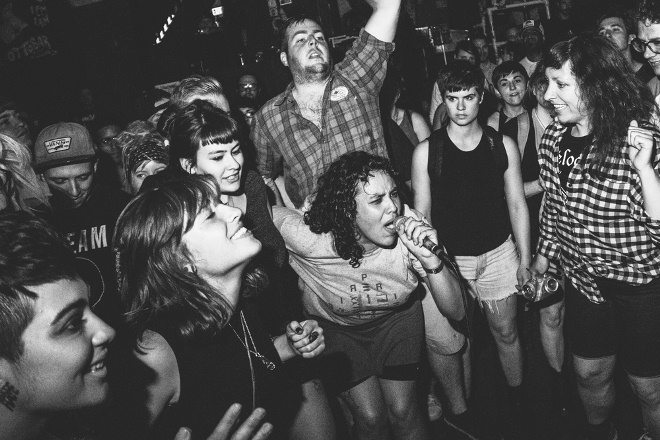
Opisali ste se kao biseksualna dvojezična politička dance sax punk stranka iz Providencea. Ono što me najviše zanima je lokalni aspekt opisa – kakvu razliku čini to što ste iz Providencea?
Victoria: Providence ima dugu povijest učini-sam prostora koji nastaju od starih mlinskih objekata koji su nekoć bili tvornice. To zasigurno utječe na našu glazbu. Tri smo godine vježbali u starim mlinskim zgradama i odsvirali prve koncerte u njima. Providence ima utjecajnu punk-scenu s puno mladih umjetnika i obojenih umjetnika. Postoji i loša strana scene ovdje, s puno bijelaca koji se izoliraju od šireg kulturnog konteksta u mnogo slučajeva preuzimanjem D.I.Y. mlinskih objekata. Puno je proturječja u Providenceu, a to je utjecalo na naše iskustvo i poruku.
Zašto vam se zadnji album zove “Full Communism”?
Joey: Ne govorimo ni o kakvom državnom političkom uređenju iz 20. stoljeća, nego o pravednom, slobodnom budućem društvu prema kojemu smjeramo. Dok trebamo biti iznimno cinični prema našim sadašnjim političkim i kulturalnim ustanovama, potrebno je da se nadamo da mi možemo stvoriti nešto bolje. Dok smo ljudi, nadamo se da bolji svijet postoji, i to nikad ne smijemo zaboraviti. O tome je naslov albuma.
Victoria: Mislim da je on odgovor na potrebu da obznanimo sudioništvo i da se podsjetimo kako svi imamo ulogu u rušenju zida status quoa.
Kako su nastali pjesma Wave of history i njezin video? Kako su se proširili Internetom?
Victoria: Joey i ja smo napisali scenarij, a naša izdavačka kuća nam je pomogla da platimo umjetnika koji bi ga ilustrirao. Naša snimka i taj video nastali su tijekom aktualnog vala protesta i povijesne analize politikom upravljanih medija nakon što je Black Lives Matter pokret dobio veliku podršku, zbog ubojstava puno Amerikanaca, nesrazmjerno obojenih ljudi i crnaca, od strane policije. Mislim da je naš video bio vrsta reakcije, a ljudi žele vidjeti i čuti medije s porukom koja barem prepoznaje bol i muku tolikih u ovom trenutku.
Kako vas američka publika prihvaća?
Victoria: Prihvaćaju nas mnogi, zbog naše snage i privilegije. Svi smo licencirani građani, fizički nam je omogućeno da se krećemo okolo, imamo članove benda koji su Bijeli, članove s puno tjelesnih privilegija, govorimo o onomu o čemu puno ljudi zapravo želi čuti. Mislim da nas ne vole ljudi kojima je od nas neugodno, jer imamo i obojene ljude, ljude koji ne odgovaraju europskim standardima ljepote, koji govore o stvarima koje imaju veze s tim da neki ljudi izgube moć, a drugi ljudi je dobiju. Ljudi ne vole slušati o nužnosti da se izabere strana, pobjedi ili izgubi.
Recite nam nešto o Spark Magu.
Victoria: Prijatelji smo s Davidom Segalom, izvršnim direktorom Demand Progressa koji su iza portala i financiraju ga. Dugo je radio na Rhode Islandu. On je zapravo bivši državni zastupnik ovdje. On je političar i dugo mu se sviđao naš bend te je htio nešto raditi s nama. Mi smo predložili ideju spajanja kulturne aktivnosti s radom Demand Progressa prije godinu dana, i činilo se kao fantazija. Polako smo drobili po tome da to postane stvarnost. Trebamo više medijskih prostora koje mi kontroliramo i koji će ovakav tip posla shvatiti ozbiljno. Neka od naših iskustava kao benda u medijima, i iskustva brojnih drugih bendova u medijima, ili njihova nemogućnost da imaju iskustva s medijima, vodila je potrebi da se ima neka vrsta alternative.
Hrvatska je jedina zemlja u Istočnoj Europi u kojoj ste odabrali nastupiti na ovogodišnjoj europskoj turneji. Zašto?
Joey: Bila je zaista samo logistička odluka. Vrlo smo uzbuđeni što sviramo u Hrvatskoj, ali voljeli bismo nastupiti u više istočnoeuropskih zemalja, no imamo samo oko tri tjedna za ovu turneju i datumi su tamo gdje smo uspjeli pronaći nastupe i sve uskladiti. Nadamo se da ćemo sljedeći put više svirati uokolo.
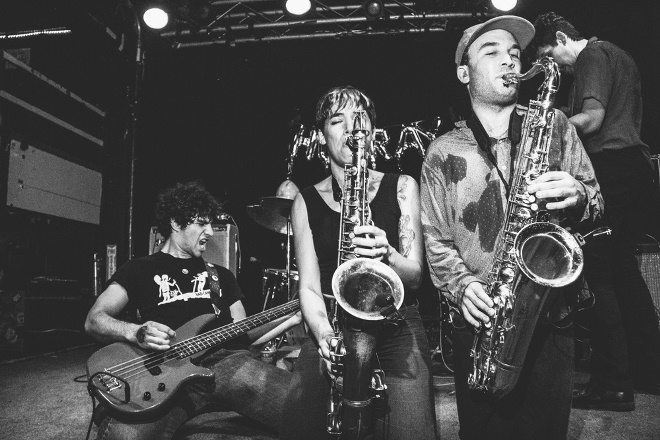
Informirate li se o političkoj situaciji europskih zemalja kako bi se nadahnuli za nadolazeću turneju?
Victoria: Neki od nas iz benda prate medije kao Al Jazeera ili Democracy Now koliko možemo. Ne znamo točno što se događa, ali putovat ćemo vrlo otvorenih ušiju, očiju, srca, i umova, da najbolje shvatimo kontekst onoga gdje jesmo.
Što možemo očekivati od vašeg nastupa u Hrvatskoj?
Joey: Uvijek smo vrlo energični i strastveni bez obzira na to gdje sviramo. Posebno smo uzbuđeni što dolazimo u Zagreb, pa ćemo zasigurno donijeti isti entuzijazam. Trudimo se uključiti publiku u svoje nastupe, učiniti od nastupa događaje koji nadilaze estetiku, stoga se nadamo da se možemo svi zajedno probiti kroz zid.
Victoria: Radimo najviše što možemo da pružimo najviše energije, poruke, i zabave što možemo.
Kakvi su vam planovi kada se nakon turneje vratite u SAD?
Victoria: Nadamo se da ćemo napisati još pjesama i po mogućnosti snimiti novi album uskoro. Nastaviti učiti i raditi stvari da nadahnemo još umjetnosti.
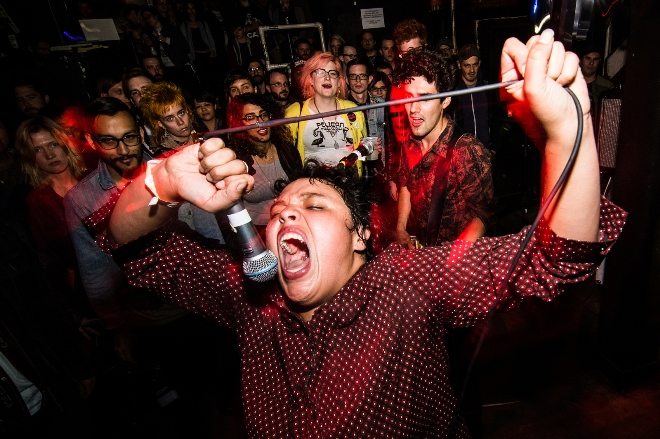
Tell us the short version of the epic event that preceded the formation of the band.
Joey: Ah do you mean the quitting video? We had actually started the band before that video was made, but it was just going at that point. Me Victoria and Norlan are all in the video. Essentially me and Victoria both work at this hotel the Renaissance Providence Hotel and they treated us terribly, so we were organizing to improve the conditions and form a union there. Eventually I decided to quit and I wanted to send one last message to my bosses, so I came to quit with a brass band that me and Norlan and our original bass player Dan played in called What Cheer? Brigade. So I handed my boss the resignation letter, told him I was quitting, and the band erupted into song. We filmed it and it became a viral Youtube video called “Joey Quits.” It became particularly popular in the Balkan region because the song we played the song “bubamara” in the video.
How did the band get together and whose idea was it to name it Downtown Boys?
Joey: It was a bit of a process! Like I said, me and Norlan and Dan played in a band called What Cheer? Brigade, so that’s how we met, and we decided to start a new band out of that. Very shortly after we started rehearsing, we asked Victoria to join, who I knew from working at the hotel. Adrienne and Mary – our current sax and bass players – joined within the last couple years. “Downtown Boys” sound both tough and queer to us, so we liked it. It’s also a lyric in the Bruce Springsteen song “It’s hard to be a saint in the city”
Who are your biggest role models among political activists, and among musicians?
Victoria: Bruce Springsteen, M.I.A., Public Enemy, Angela Davis, Franz Fanon, Malcom X, Assata Shakur, Berta Carceres, Amy Goodman, Noam Chomsky, Chaska Sofia, Maracuyeah Collective, are all really big influences artistically and politically.
What is more important to you – activism or music – and why? What are the benefits of the two combined?
Joey: I think they are both part of the same thing. We have no illusions that music alone will be a solution to anything. Music can be one tool among many to reshape society. We need a diversity of tactics to build power, and music has a unique power to build community and spread a message. But that power is meaningless if were are not also getting people into the street, into businesses and capitals to make demands, organizing our workplaces, and so on.
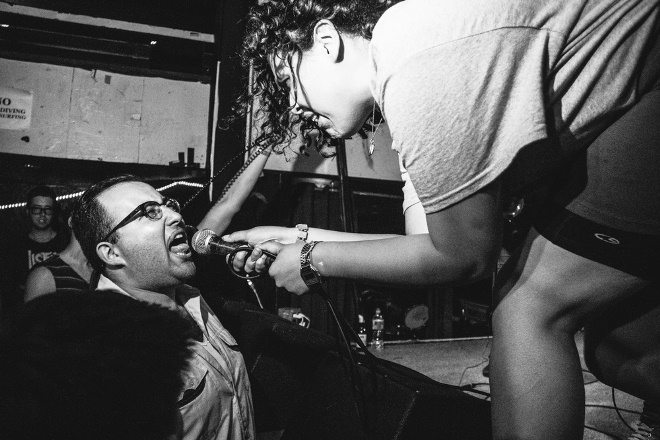
You described yourself as a Bi bilingual political dance sax punk party from Providence. What I am most curious about is the local aspect of that description – what difference does being from Providence make?
Victoria: Providence has a long history of do-it-yourself spaces that come out of old mill buildings that were once factories. That is definitely an influence on our music. We practiced for 3 years in old mill buildings and played our first shows in them. Providence has an influential punk scene with a lot of young artists and artists of color. There is also a negative side to the scene here, with a lot of white men who isolate themselves from a broader cultural context through taking over the D.I.Y. mill spaces in many cases. There is a lot of contradiction in Providence and this has for influenced our experience and message.
Why is your last album named Full Communism?
Joey: We’re not speaking about any 20th century state’s political system, but rather about the just, free future society we are working toward. While we need to be extremely cynical toward our current political and cultural institutions, we need to have hope that we can create something better. While we’re angry, we’re hopeful that a better world is possible, and we need to always remember that. That’s what the album title is about.
Victoria: I think it is a response to the need to breakthrough complicity and to reminder ourselves that we all have a place in breaking down the wall of the status quo.
How were the song Wave of history and the video for it made and how did they spread around the Internet?
Victoria: Joey and I wrote a script and our record label helped us to pay for an artist to illustrate the script. Our record and this video were made during the current wave of protest and historical analysis of the police driven media after the Black Lives Matter movement really gained a lot of momentum due to the murder of many Americans, disproportionately people of color and Black people by the police. I think that our video was some type of response and people want to see and hear media that does have a message or at least recognizes the pain and struggle of so many people right now.
How does the American audience accept you? Who likes you and who doesn’t? And why?
Victoria: We get accepted by a lot of people because of our power and privilege. We are all documented citizens, we are physically able to move around, we have members of the band who are White, members with a lot of body privilege, we speak to what a lot of people actually do want to hear. I think we aren’t liked by people who we make feel uncomfortable because we also do have people of color, people who do not fit European standards of beauty, say things that have to do with some people losing power and other people taking power. People don’t like to hear about having to pick a side and having to win or lose.
Tell us a bit about Spark Mag.
Victoria: We had been friends with David Segal, the executive director of Demand Progress, who are behind the site and are funding it. He had been doing work in Rhode Island for a long time. He’s actually a former state rep here. He’s a politician and had liked our bands for a long time and wanted to do something with us. We proposed this idea of merging a cultural activity with Demand Progress’ work about a year ago, and it seemed like a fantasy. We’ve been slowly chipping away at making it a reality. We need more media spaces that we control and that are going to take this kind of work seriously. Some of our experience in the media as a band, and a lot of other people’s experience in the media as a band, or their inability to have an experience with the media, led to a need to have some sort of alternative.
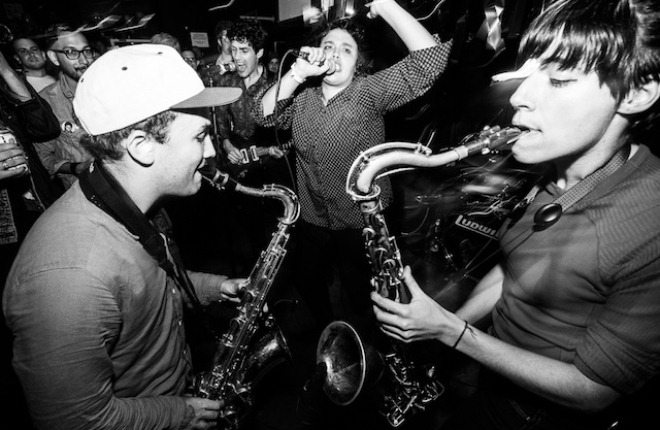
Croatia is the only country in Eastern Europe you chose to perform in on this year’s European tour. Why is that?
Joey: It was really just a logistical decision. We’re very excited to play in Croatia, but we would have loved to play in more of Eastern Europe, but we only have about 3 weeks for this tour and the dates are where we could find shows and make it all work. Next time we hope to play around more.
Do you inform yourself about the political situation in European countries to inspire yourself for the upcoming tour?
Victoria: Some of in the band read as much media like Al Jazeera or Democracy Now as we can. We don’t know exactly what is going on, but will travel with very open ears, eyes, hearts, and minds, to best understand the context of where we are.
What can we expect from your show in Croatia?
Joey: We are always very high energy and passionate no matter where we play. We are particularly excited to come to Zagreb, so we’ll definitely be bringing that same enthusiasm. We try to make our performances participatory, exciting events that move beyond just aesthetics, so hopefully we can all push through that wall together.
Victoria: We work as hard as we can to give as much energy, message, and fun as we can.
What are your plans when you return to USA after the tour?
Victoria: We hope to write more songs and possibly record another album soon. Keep learning and doing stuff to inspire more art.
Prijevod: Valentina Sertić




